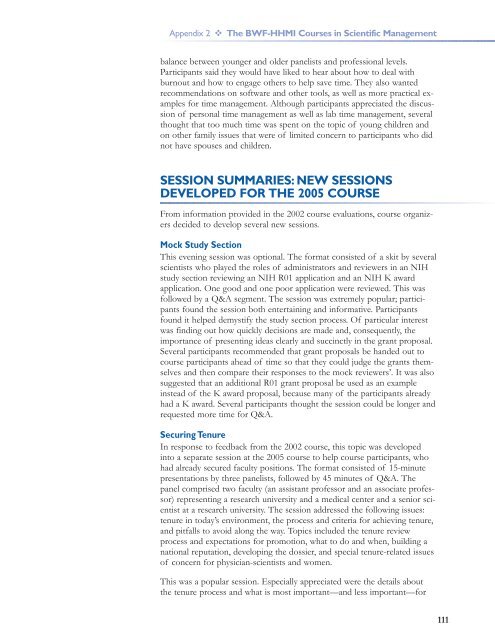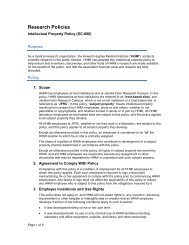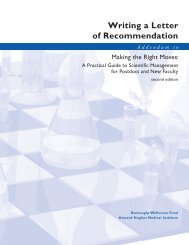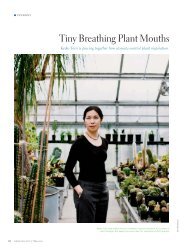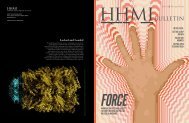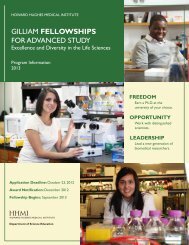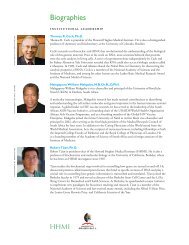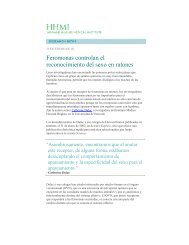Training Scientists to Make the Right Moves - Howard Hughes ...
Training Scientists to Make the Right Moves - Howard Hughes ...
Training Scientists to Make the Right Moves - Howard Hughes ...
Create successful ePaper yourself
Turn your PDF publications into a flip-book with our unique Google optimized e-Paper software.
Appendix 2 The BWF-HHMI Courses in Scientific Management<br />
balance between younger and older panelists and professional levels.<br />
Participants said <strong>the</strong>y would have liked <strong>to</strong> hear about how <strong>to</strong> deal with<br />
burnout and how <strong>to</strong> engage o<strong>the</strong>rs <strong>to</strong> help save time. They also wanted<br />
recommendations on software and o<strong>the</strong>r <strong>to</strong>ols, as well as more practical examples<br />
for time management. Although participants appreciated <strong>the</strong> discussion<br />
of personal time management as well as lab time management, several<br />
thought that <strong>to</strong>o much time was spent on <strong>the</strong> <strong>to</strong>pic of young children and<br />
on o<strong>the</strong>r family issues that were of limited concern <strong>to</strong> participants who did<br />
not have spouses and children.<br />
SESSION SUMMARIES: NEW SESSIONS<br />
DEVELOPED FOR THE 2005 COURSE<br />
From information provided in <strong>the</strong> 2002 course evaluations, course organizers<br />
decided <strong>to</strong> develop several new sessions.<br />
Mock Study Section<br />
This evening session was optional. The format consisted of a skit by several<br />
scientists who played <strong>the</strong> roles of administra<strong>to</strong>rs and reviewers in an NIH<br />
study section reviewing an NIH R01 application and an NIH K award<br />
application. One good and one poor application were reviewed. This was<br />
followed by a Q&A segment. The session was extremely popular; participants<br />
found <strong>the</strong> session both entertaining and informative. Participants<br />
found it helped demystify <strong>the</strong> study section process. Of particular interest<br />
was finding out how quickly decisions are made and, consequently, <strong>the</strong><br />
importance of presenting ideas clearly and succinctly in <strong>the</strong> grant proposal.<br />
Several participants recommended that grant proposals be handed out <strong>to</strong><br />
course participants ahead of time so that <strong>the</strong>y could judge <strong>the</strong> grants <strong>the</strong>mselves<br />
and <strong>the</strong>n compare <strong>the</strong>ir responses <strong>to</strong> <strong>the</strong> mock reviewers’. It was also<br />
suggested that an additional R01 grant proposal be used as an example<br />
instead of <strong>the</strong> K award proposal, because many of <strong>the</strong> participants already<br />
had a K award. Several participants thought <strong>the</strong> session could be longer and<br />
requested more time for Q&A.<br />
Securing Tenure<br />
In response <strong>to</strong> feedback from <strong>the</strong> 2002 course, this <strong>to</strong>pic was developed<br />
in<strong>to</strong> a separate session at <strong>the</strong> 2005 course <strong>to</strong> help course participants, who<br />
had already secured faculty positions. The format consisted of 15-minute<br />
presentations by three panelists, followed by 45 minutes of Q&A. The<br />
panel comprised two faculty (an assistant professor and an associate professor)<br />
representing a research university and a medical center and a senior scientist<br />
at a research university. The session addressed <strong>the</strong> following issues:<br />
tenure in <strong>to</strong>day’s environment, <strong>the</strong> process and criteria for achieving tenure,<br />
and pitfalls <strong>to</strong> avoid along <strong>the</strong> way. Topics included <strong>the</strong> tenure review<br />
process and expectations for promotion, what <strong>to</strong> do and when, building a<br />
national reputation, developing <strong>the</strong> dossier, and special tenure-related issues<br />
of concern for physician-scientists and women.<br />
This was a popular session. Especially appreciated were <strong>the</strong> details about<br />
<strong>the</strong> tenure process and what is most important—and less important—for<br />
111


